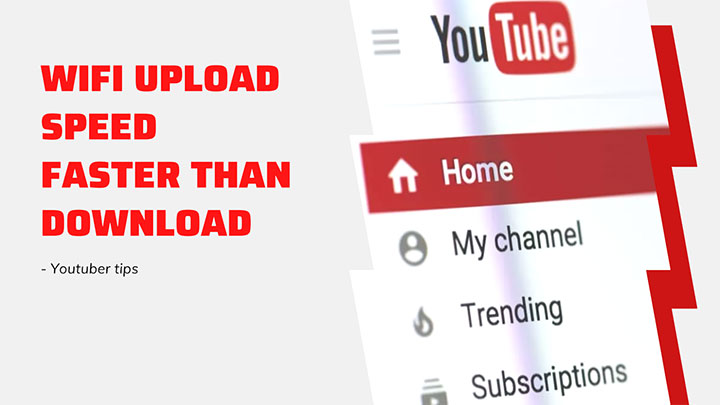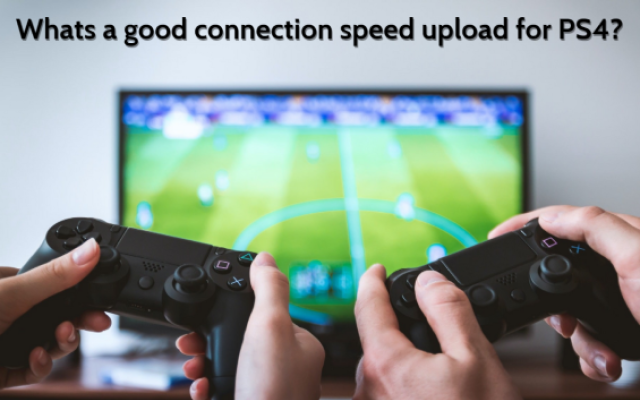What Is A Good Upload Speed For Streaming? Twitch, Youtube, Facebook
As a big fan of streaming, you are probably concern with what is good uload speed for streaming. In this post, we’ll break down the detaied upload speed requiremets for different platforms and several simple steps for improving upload speeds.
Good upload speed for streaming
Why upload speed is important to streaming?
When you're live streaming, footage from your device is transferred from your home to video servers elsewhere on the internet. Because most individuals watch more online video material, video data usually travels in the opposite direction.
As a result, upload speed is critical.
Because most internet service providers (ISPs) don't advertise upload speeds as prominently as they do download speeds (your "advertised" speed refers to your download speed), it might be difficult to assess.
Most internet connections have upload speeds that are substantially slower than download speeds. Because upload speed might fluctuate, the simplest approach to determine your actual upload speed is to take a speed test.
Fiber is your best bet if you want an upload speed that matches your download speed. To live stream without buffering, what is a good upload speed?
Minimum upload speed for streaming
What is a good upload speed for streaming?
Streaming live video can take up a lot of bandwidth. To determine good streaming upload speed, you need to consider several factors such as encoding, the type of content, resolution, frame rate, and platforms you want to stream. So what is a good upload speed for streaming on twitch,
Where applicable, we'll divide the data by platform, resolution, and frames per second. Here's a breakdown of the upload speeds required to broadcast on three main platforms.
Recommended upload speed for Facebook Live:
-
Aim for an upload speed of 6 to 7 Mbps if you wish to stream in 1080p.
-
Recommended upload speed for live streaming 720p video at 30 or 60 frames per second are 3 to 4 Mbps.
Recommended upload speed for Twitch streaming:
-
Streaming 720p video at 30 frames per second requires upload speeds between 3.2 Mbps and 5 Mbps.
-
Twitch streaming upload speed for 720p video at 60 frames per second and 1080p video at 30 frames per second required upload speeds are between 4.4 Mbps and 6.2 Mbps.
-
Upload speed for streaming twitch of 1080p video at 60 frames per second, you need upload speeds between 5.6 Mbps and 7.4 Mbps.upload speed for streaming twitch.
The minimum upload speed for streaming on twitch is 1 mbps upload speed streaming.
Recommended upload speed for streaming
Recommended upload speed for YouTube:
-
For 720p video, you need upload speeds of between 2.9 Mbps and 7.4 Mbps.
-
The required upload speed for streaming 1080p 60fps are between 3.8 and 11 Mbps.
-
For 1440p video, the upload speed range is 6,000 to 13,000 kbps. That’s between 7.4 Mbps and 15.8 Mbps in recommended upload speeds.
-
For 1440p video at 60 frames per second, the required upload speed is from 11 Mbps to 41 Mbps.
-
To stream 4k video, the recommended upload speeds are from 24.2 Mbps and 61.5 Mbps.
While you can technically stream as long as you fulfill the basic criteria, you should always plan for at least an extra 5 Mbps to accommodate for speed changes.
Test upload speed
Your ISP's claimed upload bandwidth and the actual upload speed you can obtain with your connection may differ significantly for a variety of reasons. As a result, you should always run a upload speed test. The results of these tests should at the very least meet the requirements listed above.
Simply visit Gospeedcheck.com and click the “Go” button. The test will automatically measure your internet connection and you’ll get the results within a few seconds.
How to improve upload speed for streaming?
There are several tips on how to increase upload speed for streaming you may need:
-
Replace your router: There are several measures you may do to increase your Internet speed.
-
Use a wired connection: Wireless connections are usually slower and less dependable than wired connections. WiFi signals must travel and pass through impediments such as walls and doors, reducing the speed and dependability of your connection.
-
Limit the number of devices on your network: Having multiple gadgets connected to your internet at the same time might significantly slow down speeds, so consider unplugging these. Wireless printers and mobile phones are examples of such devices.
-
Avoid uploading at peak times: This isn't really useful if you need to upload something rapidly right now, but off-peak hours have substantially faster speeds, so keep that in mind when deciding when to upload things.





0 Comments
Leave a Comment
Your email address will not be published. Required fields are marked *